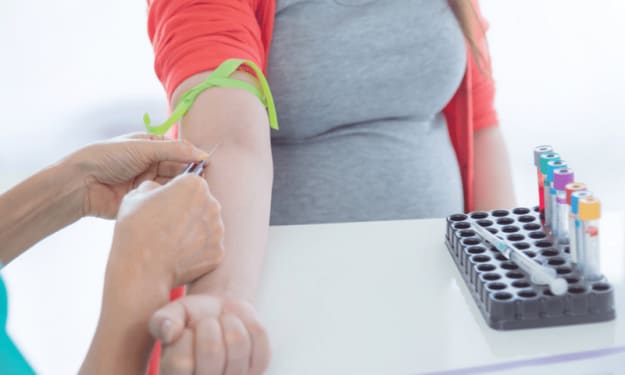
A pregnancy ultrasound test is carried out by a Gynecologist or a skilled technician. They use a plastic transducer to transmit high-frequency sound waves through your uterus. These sound waves convert into images of your baby as the signals are sent back to the machine.
Ultrasound tests help to provide your doctor with a lot of valuable information about the health of the baby as well as the mother. It helps to monitor your baby's growth, detect abnormalities, if any, and treat them in the initial stages. They are also able to predict your due date, determine whether you're carrying multiple babies, determine the sex of the baby, and indicate the position of your placenta.
What are the Different Types of Ultrasounds Offered in a Pregnancy?
There are 3 main types of ultrasound tests offered during pregnancy. They are as follows:
1. Dating Scan - A dating scan confirms your due date. If you are unsure of your last menstrual period or your date of conception, this scan is helpful. Women who are in their 10 weeks to 13 weeks’ gestation period usually take this scan. But you can take it any time after 6 weeks.
2. Nuchal Translucency Scan - This type of ultrasound test helps the mother work out the risk of her baby having a chromosomal abnormality. You can take this test separately or as part of the dating scan. Your doctor might advise you to take a blood test with it.
3. Morphology or Anomaly Scan - An morphology or anomaly scan is a detailed ultrasound test that looks at your baby’s body and observes the position of the placenta, the amniotic fluid around your baby, the umbilical cord, and your uterus & cervix. It is usually done at 18 to 20 weeks' gestation.
To help you prepare for these important pregnancy scans, here are the most common types of ultrasounds and when you should expect them.
Early Pregnancy Ultrasound (6-8 Weeks) -
Your first ultrasound test is known as a baby sonogram. This might take place when you're six to eight weeks pregnant. However, not every woman will get this scan. Some doctors only conduct this test for certain high-risk pregnancy conditions like abdominal pain, bleeding, and history of birth defects or miscarriage.
An early pregnancy ultrasound may be done transvaginal so doctors can get a clearer picture of your baby. In this case, your OB-GYN will place a thin wand-like transducer probe that transmits high-frequency sound waves through your uterus into your vagina. The black and white image of your baby is born when the sound waves bounce off the fetus and send signals back to the machine.
At six weeks' gestation, it is possible to see the baby's heartbeat. Your doctor will also predict your baby's due date, determine the number of babies in the womb, track milestones, and see whether you have an ectopic pregnancy.
Dating Ultrasound (10-13 Weeks) -
If you did not have your six to eight-week ultrasound test, this is a recommended test for you. A dating ultrasound around weeks’ 10 to 13 of pregnancy provides the parents the same type of information like due date, your baby's crown-rump length (measurement from head to bottom), the number of babies in the womb, and the fetal heartbeat.
Nuchal Translucency Ultrasound (14-20 Weeks) -
A nuchal translucency (NT) test checks for Down syndrome, heart defects, or other chromosomal abnormalities. You can take this test between 14 and 20 weeks. You should not skip this test if the mother is 35 years or older, has a family history of certain birth defects, or if their screening test revealed a potential problem.
In a nuchal translucency screening, the doctor will use an ultrasound test to gauge the thickness at the back of the baby's neck. They'll also measure proteins and hormones with a blood test. If your baby has a thicker neck it may indicate an increased risk for birth defects including trisomy 18 and Down syndrome.
Anatomy Scan (18-20 Weeks) -
This detailed pregnancy ultrasound test happens between weeks 18 and 20. You can take this test in the second trimester. It lasts for 20 to 45 minutes if you are having one baby. It can take longer if you are having multiples babies. It's the most thorough check-up your baby will have before they're born.
During the anatomy scan, the doctor will check your baby's heart rate and look for abnormalities in their brain, heart, kidneys, and liver. They'll check for birth defects, count your baby's fingers and toes, measure the amniotic fluid level, and examine the placenta.
They will probably also be able to tell the baby's sex, although it's not a slam dunk; an experienced tech gets it right more than 95 percent of the time.
Third Trimester Ultrasound Test -
This test is usually done for mothers if their pregnancy is considered high-risk. If you have high blood pressure, low levels of amniotic fluid, bleeding, preterm contractions, or are over age 35, you might have to undergo this ultrasound test.
Your healthcare provider may perform low-resolution ultrasound tests during your prenatal visits for reassurance. You'll also have to get a follow-up ultrasound if your cervix was covered by the placenta at your 20-week scan.
Doppler Ultrasound -
This ultrasound test bounces high-frequency sound waves off circulating red blood cells to measure blood flow and blood pressure. Unlike, a regular ultrasound that uses sound waves to produce images, this test helps to determine if the baby is getting enough blood.
Other Pregnancy-Related Ultrasound Tests
Your doctor may conduct other pregnancy-related tests that require ultrasounds. These include amniocentesis or chorionic villus sampling (CVS). Fetal echocardiograms detect abnormalities and show the baby’s heart rate, it also uses ultrasound technology.
How Many Ultrasounds Are Safe During Pregnancy?
Ultrasounds are safe for both the mother and the baby if done for medical purposes. Even though ultrasound tests don’t require radiation, only a trained professional who can interpret the results with accuracy should perform them. Your technician should have a working knowledge of obstetrical ultrasound.
Some medical practices now offer 3D (high quality and lifelike) and 4D (moving picture) ultrasounds, which may help doctors detect certain fetal abnormalities and birth defects with ease. These types of ultrasounds are also available at fetal portrait studios in places like shopping malls.
These types of ‘keepsake’ are not encouraged by experts because ultrasounds should not be carried out by untrained personnel. They may give out inaccurate information about the baby which may get you all worked up. Plus, ultrasounds are safe when conducted in medical settings, but in a mall, if they are not careful, they might heat tissues or produce bubbles (cavitation) during use.
Experts aren't sure about the long-term effects of heated tissues or cavitation when ultrasound tests happen outside of a medical setting with non-trained professionals. Therefore, ultrasound scans should only be done when there is a medical need, based on a prescription, and performed by appropriately-trained operators.
Final Thoughts -
Pregnancy ultrasound tests can make you very happy as they let you know a lot of details about your baby like when you will have a baby, the baby’s sex, heartbeat, and fetal age. You will be able to feel more relaxed if you have a detailed ultrasound scan. This also helps you make better decisions regarding your pregnancy in the later trimesters.
About MediBuddy:
MediBuddy is a Digital Healthcare platform that provides Online Medicine Delivery, Health Check ups , Book Lab tests online & Online Doctor consultations through its online app and website. It delivers medicines across 95% of pincodes in the country.
With the help of the live tracking option from the order, the user is able to check the current live status of the placed medicine order.
About the Creator
MediBuddy
MediBuddy - India’s Largest & most Trusted Digital Healthcare Platform for Online Doctor Consultation, Health checkups, Lab tests at home, Online Medicines, wellness & fitness needs.
Download MediBuddy app and Consult Doctor Online.






Comments
There are no comments for this story
Be the first to respond and start the conversation.